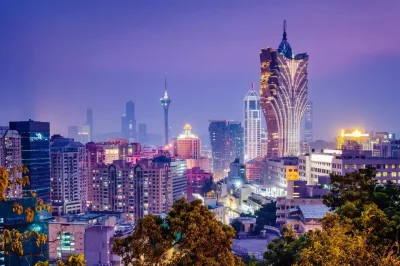 The falling casino revenues in the largest gambling hub on a global scale, are having extremely negative consequences for the wider economy of Macau, forcing a large number of businesses to cease their operation in the special administrative region. The closures, on the other hand, have triggered the highest levels of unemployment since 2009.
The falling casino revenues in the largest gambling hub on a global scale, are having extremely negative consequences for the wider economy of Macau, forcing a large number of businesses to cease their operation in the special administrative region. The closures, on the other hand, have triggered the highest levels of unemployment since 2009.
Earlier today, local officials announced one of Macau’s worst monthly gambling revenues since September 2020. Only a week earlier, the Government of the former Portuguese colony warned that increasing job losses and financial difficulties could make the city’s security less stable by triggering social conflict.
For the time being, the special administrative region is the only place in China where casino gambling is legally permitted. Despite the efforts of the local authorities, Macau, however, has been facing some difficulties in diversifying its economy and so far remains considerably dependent on casino tax revenue.
University of Macau professor Glenn McCartney shared that the former Portuguese colony is currently the most-reliant city on tourism in the world and there are currently no other industries in the city that could make the same tax contributions as the gambling sector. The bad news is there is no quick fix for the situation, especially considering the fact that there was no diversification for 2 years.
Negative Impact of Covid-19 Pandemic Hits Macau’s Casino Sector Hard
 The city’s massive dependence on gambling has been particularly visible since the beginning of the Covid-19 pandemic. During the first quarter when the coronavirus hit, visitation rates fell by over 80% in comparison to the same period of the previous year because of the travel restrictions associated with the coronavirus lockdown measures.
The city’s massive dependence on gambling has been particularly visible since the beginning of the Covid-19 pandemic. During the first quarter when the coronavirus hit, visitation rates fell by over 80% in comparison to the same period of the previous year because of the travel restrictions associated with the coronavirus lockdown measures.
Usually, over 90% of Macau visitors originate from mainland China, where the Government sticks to its no-gambling policy on one hand, and on the other hand, still pursues “zero-Covid” measures.
According to reports, the May gambling revenues of Macay experienced a 68% decline year-on-year, reaching 3.3 billion patacas. The six casino companies that currently operate in the city are still facing serious revenue losses and accumulating debt, while the local residents’ unemployment rate has increased from 1.8% in 2019 to 4.5%. The gambling industry has not been the only economic sector affected by the constantly increasing losses which have spread to industrial, retail, and commercial services.
For some time now, the Chinese Government has been aimed at imposing stricter measures on the local junket industry, which has been luring high-roller players from mainland China to the special administrative region’s casino industry.
The Macau Economic Association shared that Macau’s local business climate index is expected to remain poor in the following 3 months. Earlier this year, the International Monetary Fund (IMF) warned that the city’s economy would likely need several years until it returned to its pre-pandemic levels.
In April, the Emperor Entertainment Hotel announced its decision to close its casino as of June 26th due to the tough business environment and unfortunate projections for the VIP gaming segment. According to some analysts’ expectations, no less than 7 other Macau casinos are expected to cease operation by the middle of 2022.